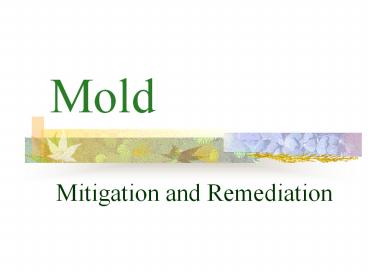Mold PowerPoint PPT Presentation
1 / 39
Title: Mold
1
Mold
- Mitigation and Remediation
2
What is Mold?
- Mold Mildew are the same thing
- Fungi
- Twenty five percent of Earths Biosphere
- Odorless
- Producer of Spores
- Allergen
- Possibly Toxic
3
Common Molds
- Absidia
- Alternaria
- Ascomycetes
- Aspergillus
- Basidiomycetes
- Cladosporium
- Curvularia
- Fusarium
- Mucor
- Penicillium
- Pithomyces
- Stachybotrys
- Trichoderma
- Ulocladium
4
Alternaria
5
Cladosporium
6
Aspergillus Niger
7
Stachybotrys
8
Mold on Wallsand Ceilings
9
WallpaperInsulation
10
When is Mold a Consideration?
- When You See It
- When You Smell It
- If there has been significant water damage
- When Health Symptoms exist
11
Symptoms of Exposure to Mold
- Runny Nose
- Headache
- Difficulty Breathing
- Depression
- Irritability
- Coughing
- Loss of Energy
- Skin eruptions
- Bloodshot Eyes
- Poor Appetite
- Sinus Problems
- Sore Throat
12
Ten Steps for Mold Mitigation
- Stop the Intrusion of Water
- Deprive Mold of Moisture Through Dehumidification
- Filter the Spores out of the Air
- Remove any Wet, Damaged or Infested Material
using Containment When Appropriate
13
Ten Steps for Mold Mitigation
- Make Sure What is Left is Dry
- Treat Remaining Material for Latent Spores
- Replace Damaged Material
- Wipe Down all Hard Surfaces
- Wash Soft Goods to Remove Spores
- Vacuum using HEPA Vacuum
14
Sources of Water Intrusion
- Breach of the Buildings Exterior
- Wind Driven Through Otherwise Water-Tight Spaces
- Flooding
- Broken Pipes
- Backed up Sewage
15
Mitigation Response
- Repair Source of Intrusion
- Caulk and Seal
- Influence Source of Flooding
- Repair/Install Backflow Device
- Reshape Drainage
16
Exterior Drainage
17
Wall and Roof Construction
18
Dehumidifier Condensate Pump
19
Sources of Excess Moisture
- Shrubbery/Landscaping
- Mulch
- Clothes dryer vents
- Stove vents
- Bathroom fans
- Crawl Spaces
- Ventilation
- Plastic
20
Size of Mold Spores
Mold/Fungi Diameter
Filter Selection
(microns)
(MERV) Phialophora spp.
1.5 13 Exophiala jeanse
lmei 2
13 Acremonium spp. 2.5
9 Penicillium spp.
3.3 7
Aspergillus spp.
3.5 6 Absidia corymbif
era 3.8
6 Trichoderma spp. 4.1
6 Stachybotrys spp.
5.7 6
Mucor plumbeus 7.5
6 Rhizopus stolonifer
8 6 Cladosporium sp
p. 9
6 Blastomyces dermatiitidis 14
6 Alternaria alternata
14.4 6
21
MERV Microbial Efficiency Rated Value
22
HVAC Alternative Filter Systems
23
Stand Alone Filters
24
A Cautious Remediation Approach is Recommended
When
- Toxic Mold is Identified or Suspected
- Extensive Hidden Mold is expected
- Chances of Mold Spores Becoming Airborne is High
- When Sensitive Individuals are Present
25
EPA Infestation Chart
- Small Less than 10 Square Feet
- Medium From 10 to 100 Square Feet
- Large Greater than 100 Square Feet
26
Personal Protection for Small Infestations (Less
than 10 sq. ft.)
- Gloves
- N-95 Respirator mask
- Eye Protection
27
Limited Containment
- Polyethylene sheeting floor to ceiling
- Seal HVAC Supplies and Returns
- Negative Pressure with a HEPA Filter
- Gloves
- N-95 Respirator or Half-Face HEPA Filter
- Disposable Overalls
- Eye Protection
28
Full Containment
- Two layers of Plastic with Air Lock
- Negative Pressure with HEPA Filter
- Block Supply and Return Vents
- Gloves
- Disposable Full Body Clothing
- Headgear
- Foot Coverings
- Full Face Respirator with HEPA Filter
29
Removing damaged material within 48 hours, before
it becomes infested, requires far less caution,
less work, and less expense.
30
Combining the rapid removal of wetted material
with the use of a de-humidifier and filters is an
important strategy to significantly mitigate
losses.
31
Steps During Restoration Phase
- Dry
- Treat
- Restore/Upgrade
- Wipe
- Wash
- Vacuum
32
Small Spore Vacuum Cleaners
33
Common Cleaning Chemicals
- Phenols Disinfectants. Corrosive to Rubber and
Some Plastics - Quaternary Ammonium Compounds Neutralized by
Cotton and Charcoal - Halogens Bleach, Chlorine, Corrosive, Toxic
- Alcohol Flammable Degrades Some Plastics
34
HVAC Systems
- Ductwork
- Insulation
- Make Up Air
- Pre-Conditioning
- Filtration
35
Alternative Mold Treatments
- Aerosols
- Natural Extracts
- Ozone
- Ultraviolet Light
36
Safe Levels of Mold
- EPA
- CDC
- California Safe Building Code
- Canada
- Others
37
Testing for Mold
- Petri Dish Sampling
- Air Samples
- Slide Samples
- Bulk Samples
- Testing For Species
38
Teaching Mold Mitigation
- Give Underlying Information
- Explain Why Information is Relevant
- Make Connections to Form New Beliefs
- Use Multiple Channels of Communication
- Use Anecdotes
- Invoke Participation
- Discuss In Emotionally Neutral Environment
39
Prepared by RAJohnsonCTP_at_msn.com

